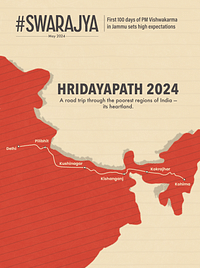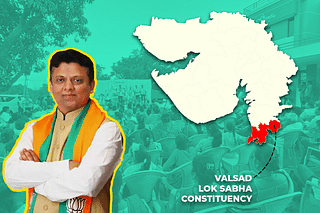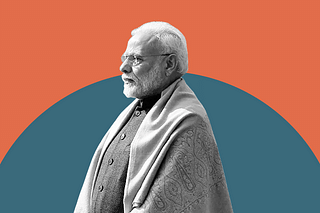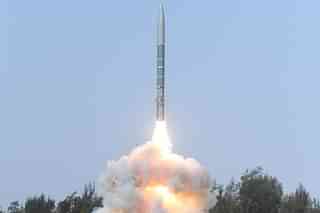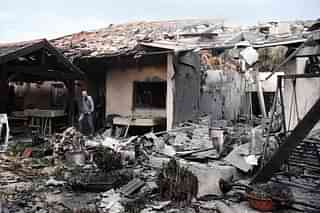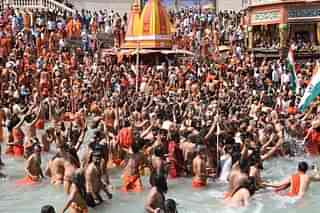Politics
NEDA: More Than Just A Political Alliance
Jaideep Mazumdar
Jul 15, 2016, 11:33 AM | Updated 11:33 AM IST
Save & read from anywhere!
Bookmark stories for easy access on any device or the Swarajya app.
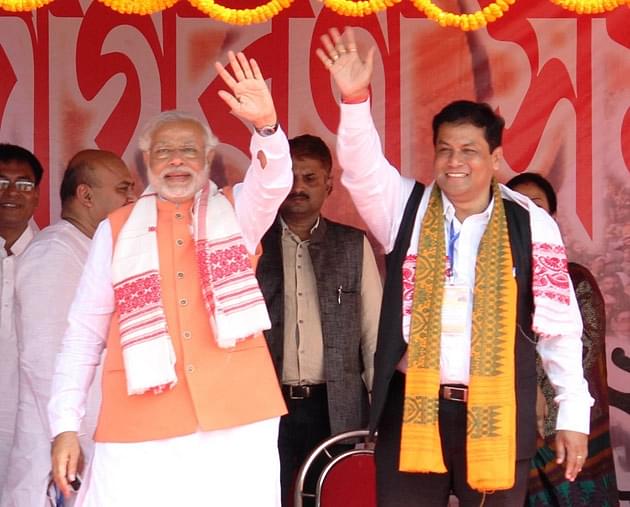
The North East Democratic Alliance (NEDA), which was formally launched by Bharatiya Janata Party (BJP) President Amit Shah in Assam’s capital Guwahati on Wednesday, is much more than a mere alliance of 10 political parties formed with the aim of ousting the Congress and coming to power in all the eight states of this region. NEDA represents an important shift in the politics of the region and, more significantly, a bold strategic transformation in the BJP itself.
The formation of NEDA is an eloquent testimony to the BJP’s flexibility, its capacity to adjust, embrace new strategies and partners and identify itself at the micro level with the regional aspirations of the people of the region. The nine other constituents of NEDA (apart from the BJP) are a diverse set representing various ethnic groups with their distinct, and at times competing, aspirations and outlooks. It is, thus, a major achievement for the BJP to be able to bring all of them together on one common platform. Never before has such an experiment been tried in this region.
The first and obvious fallout of this formation is the complete isolation of the Congress in the region. The Congress is in power in Meghalaya, Mizoram, Manipur and (after Wednesday’s Supreme Court verdict) in Arunachal Pradesh (though it is a minority government in that state). In none of these states is it sharing power with regional parties. In fact, the Congress has a dismal track record of managing coalitions with regional parties in the Northeast. Meghalaya is a case in point. The ruling Meghalaya United Alliance government is an opportunistic mix of Congress and Independent MLAs; the other regional parties that had joined hands with the Congress in the past to rule that state are now arrayed against the Congress, and some are part of NEDA.
In the other states of the region, the Congress has, almost always, pitted itself against regional parties. And when it has formed alliances with regional parties, those have been mostly post-poll alliances aimed primarily at capturing power or clinging on to it. However, none of these Congress-led alliances have lasted beyond a few years at best. And the larger political narrative in Northeast India has always revolved around the ‘Congress versus regional parties’ plot.
The formation of NEDA is, therefore, a masterstroke by the BJP. It also demolishes the myth that the BJP is a monolithic, rigid party with a one-point Hindutva agenda. By stitching a principled alliance with regional parties as diverse as the Mizo National Front (which led a two-decade long insurgency seeking sovereignty) and the Bodoland People’s Front (led by Hagrama Mohilary, who headed the particularly violent Bodo Liberation Tigers Force that had fought for a separate Bodoland state to be carved out of Assam), the BJP has displayed its flexibility, accommodating spirit and powers of adjusting and adapting to changing times, situations and scenarios.
What is also remarkable is that NEDA is a microcosm of the entire Northeast India with its diverse tribes practising different religions and having different aspirations. Meghalaya, Nagaland and Mizoram are all Christian-majority states and represented in NEDA by the National People’s Party (formed by former Lok Sabha Speaker Purno Agitok Sangma) and the United Democratic Party (Meghalaya), the Naga People’s Front and the Mizo National Front, all fiercely regional parties.
In Assam, apart from the Bodoland People’s Front, NEDA has the Asom Gana Parishad (an Assamese nationalist party born out of the anti-Bangladeshi immigrant Assam movement of the early to mid-1980s) and the Gana Shakti, a small party representing the Mishing tribe, as its constituents. The other constituents are the 37-year-old People’s Party of Arunachal, the Sikkim Democratic Front, which has been in power in the Himalayan state for 22 years now, and the BJP.
It must be noted that these regional parties were formed largely in response to the Congress’ high-handedness, corruption, misrule and that party’s ‘High Command’ culture (wherein Congress leaders from the region had to pay regular obeisance to the Gandhi family) that alienated the indigenous people of the region. These parties were formed to champion the regional aspirations of the people of these states, aspirations which the Congress either failed, or refused, to protect and promote.
That these parties have found in the BJP a national and Indian nationalist party, a reliable partner worthy of their trust, and their belief that the aspirations of the people of the region would be met, speaks volumes about the BJP’s acceptability in a region where people of different faiths and customs live. These regional parties have found in the BJP a party that is in sync with the syncretic culture of the region. This proves the falsity of the vicious and motivated campaign carried out by the so-called left-liberal cabal in the rest of the country about the BJP being an intolerant party. Rather, the rejection of the Congress by regional parties of Northeast India is proof enough of the fact that it is the Congress that is intolerant, rigid, incapable of accommodating diverse and divergent aspirations and, above all, hegemonist.
What is also significant is that the stated objective of NEDA is not only to promote the development of the region but also to resolve all disputes between the various states of the region (mostly on the demarcation of inter-state boundaries) and between various tribes through a process of dialogue. Since NEDA is a platform where, as BJP chief Amit Shah said during its launch, all constituents would have an equal say in matters pertaining to the region, intra-regional disputes and differences will find a means of peaceful and just resolution. The Congress had not only promoted such disputes and differences for its narrow political gains but had also exacerbated them with its big-brotherly attitude.
It is certain that more regional parties will join NEDA. The process of getting regional parties on board is a delicate and time-consuming one that requires loads of patience and negotiating skills. The BJP’s strategists and leaders in the region have displayed their mastery over such skills. Prominent among them is NEDA convenor Himanta Biswa Sarma, who is widely credited, along with Chief Minister Sarbananda Sonowal and a clutch of state-level leaders acting under the stewardship of Prime Minister Narendra Modi and BJP chief Amit Shah, for crafting the BJP’s spectacular victory in Assam in May this year.
Manipur is one state where NEDA will become stronger in the near future. Manipur goes to the polls in March next year, and some regional parties there, fed up with the corruption and misrule of the Congress government under Okram Ibobi Singh, which has been in power since 2002, are expected to join NEDA. The BJP has already notched impressive gains in the state and is in a strong position to form the government in alliance with some regional parties there.
The Mukul Sangma-led Meghalaya United Alliance government in that state is on shaky ground, thanks to acute dissension within the Congress ranks. Sangma is facing a running revolt from his MLAs. The Congress’, and his, unpopularity was demonstrated by the electorate of his stronghold, the Garo Hills, which gave a humiliating thumbs-down to his wife in the bypolls to the Tura Lok Sabha seat held in April this year. The National People’s Party (a NEDA constituent) candidate and late Purno Sangma’s son Conrad was elected by a huge margin of nearly two lakh votes. Meghalaya goes to the polls in March 2018 and, if the Congress government is still in power till then, which in itself will be somewhat surprising, it is sure to be delivered a crushing defeat by the people of the state.
The Congress government in Mizoram is in its second term and is already beset by strong anti-incumbency. The Mizo National Front, a constituent of NEDA, has a very good chance of winning the next elections scheduled for end-2018. Not the least because the Congress regime there stands, typically, accused of corruption, nepotism, misrule and sloth. Nagaland also goes to the polls in March 2018, and there is no reason why the Naga People’s Front, which has been ruling the state since 2003, will not return to power. The Congress, again very typically, is a highly divided house in Nagaland, and there are no chances of it bouncing back to power there in 2018.
The BJP has made impressive inroads in Tripura and has been assiduously building up its organisation in that communist-ruled state where the Congress is in total disarray. Though the Manik Sarkar government there is still going strong, disenchantment among the people with the CPI(M) that has been ruling the state for 23 years now, and with the failed political ideology (communism) that has been discredited and discarded by the rest of humanity, is growing. This presents an attractive opportunity for the BJP in Tripura, which also goes to the polls in March 2018.
It is only a matter of time the minority Congress government in Arunachal Pradesh, despite the misplaced euphoria over the Supreme Court’s verdict, falls and the People’s Party of Arunachal, with the support of the BJP and others, comes to power in that state. Which means that come 2019, when the next Lok Sabha polls will be held, the entire Northeast India, barring maybe Tripura, will be ruled by NEDA. That is sure to give a significant leg-up to the BJP in the next general elections. And, hopefully, silence once and for all the critics who portray the BJP as a dogmatic and dictating party. NEDA is set to prove that the BJP is the truly tolerant, democratic and syncretic party, not the Congress.
Save & read from anywhere!
Bookmark stories for easy access on any device or the Swarajya app.
Jaideep Mazumdar is an associate editor at Swarajya.
Support Swarajya's 50 Ground Reports Project & Sponsor A Story
Every general election Swarajya does a 50 ground reports project.
Aimed only at serious readers and those who appreciate the nuances of political undercurrents, the project provides a sense of India's electoral landscape. As you know, these reports are produced after considerable investment of travel, time and effort on the ground.
This time too we've kicked off the project in style and have covered over 30 constituencies already. If you're someone who appreciates such work and have enjoyed our coverage please consider sponsoring a ground report for just Rs 2999 to Rs 19,999 - it goes a long way in helping us produce more quality reportage.
You can also back this project by becoming a subscriber for as little as Rs 999 - so do click on this links and choose a plan that suits you and back us.
Click below to contribute.
